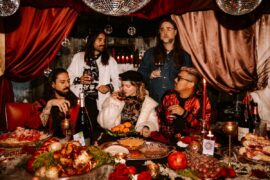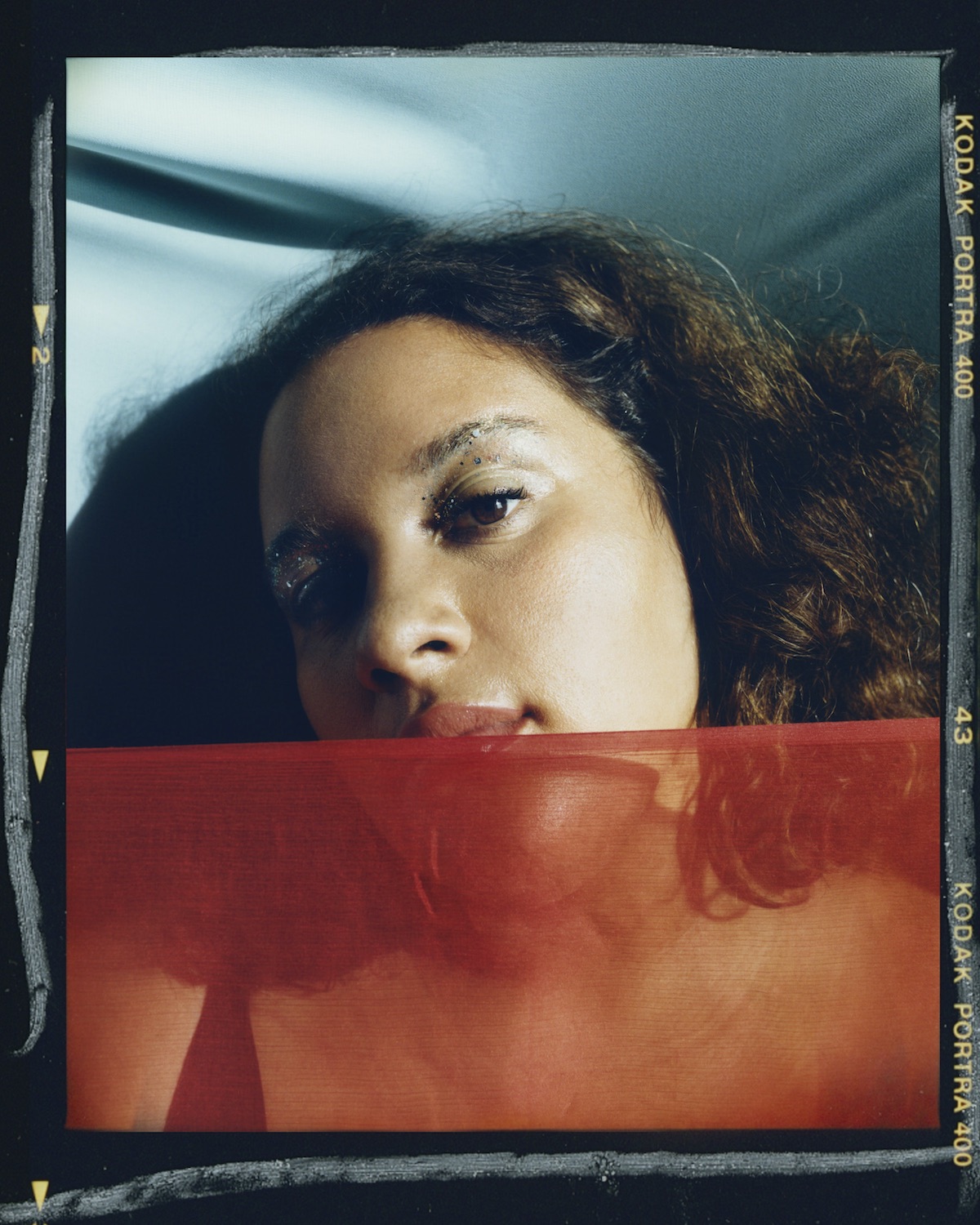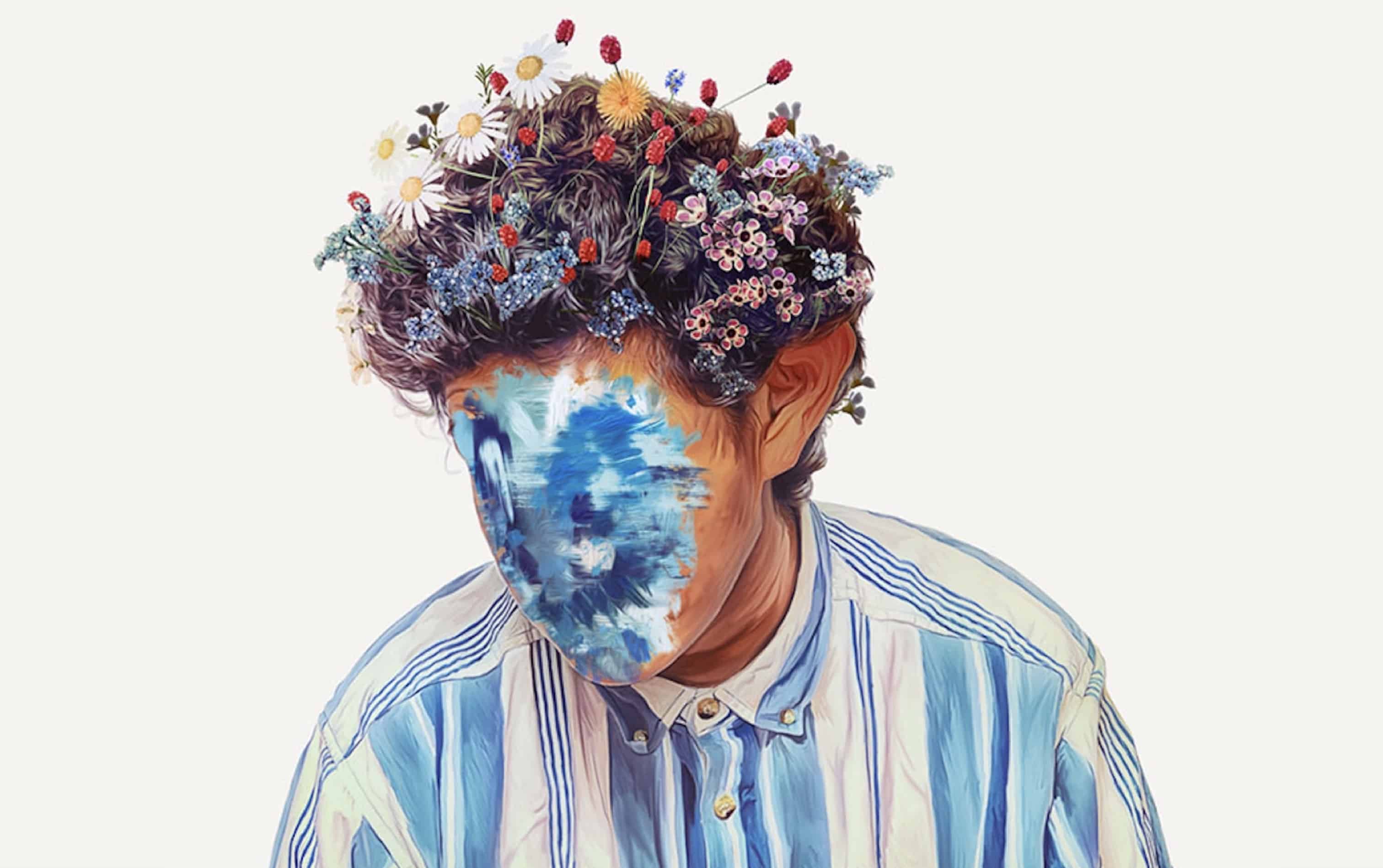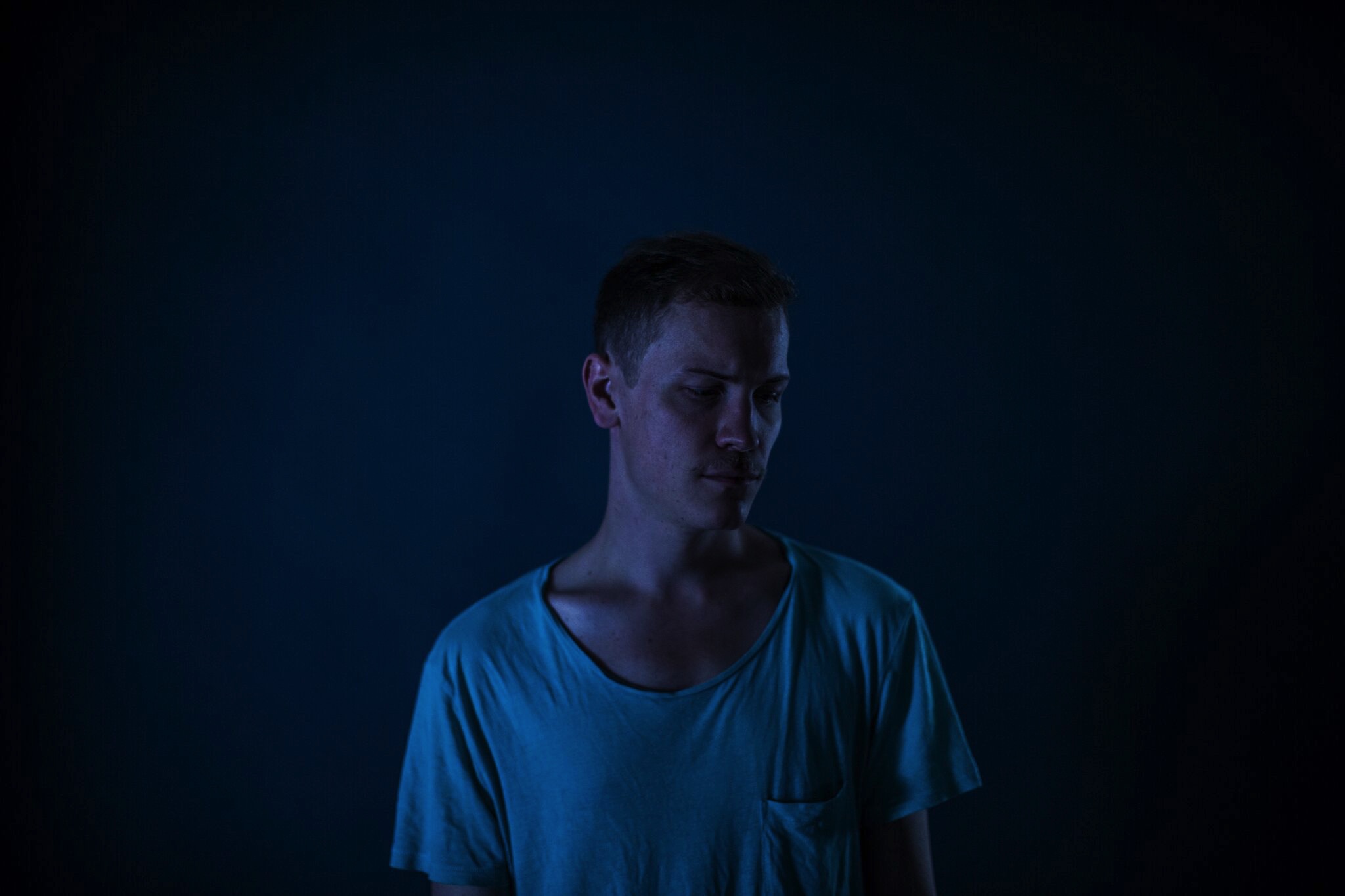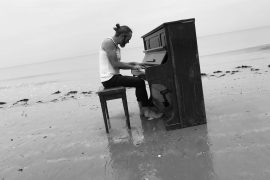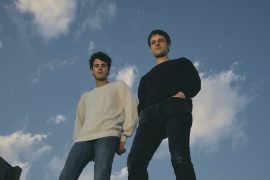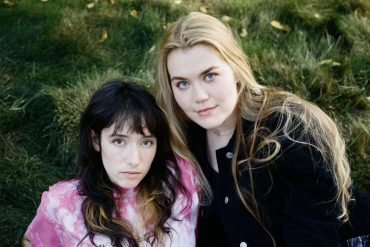Intimately drifting between the genres, feelings, and emotions within and without him, Genesis Owusu projects himself as an artist’s artist on his sophomore album, ‘STRUGGLER.’
Stream: ‘STRUGGLER’ – Genesis Owusu
I wrote a short story, and it was the story of a roach that runs and runs and runs, trying not to get stepped on by God. And the album kind of came as a question of like, ‘How would this story sound?’
Divesting ourselves from the world to find true meaning is at the core of all art, but only if that search leads back within.
Genesis Owusu had been on tour since the release of his debut Smiling with No Teeth when he began writing and formulating his new album, STRUGGLER, a dynamic and coded body of work that asks us to consider ourselves as part of bigger systems. It’s a project that can only be described by the man himself, takes parts of his subconscious and blows them up to beautiful proportions.

Genre has long been a sticky subject for Owusu and his fans, as they consistently push back on the funk/rap label the industry is all to happy to foist upon him. Genre can be helpful, but true artistry comes from taking things day by day, understanding how the phases of our lives overlap and bringing them into focus for audiences.
Owusu is inspired by funk, inspired by rap, inspired by folk music, inspired by electronic music. But like everyone else, his interests expand elsewhere, and these outside fascinations, in his words, “coalesce” into a portrait of a man who is always looking for meaning.
Here’s an unfiltered discussion about the process behind this album, and the many conflicting ideas he brought together to continue an already inspiring catalogue.
Genesis Owusu recently received seven nominations for the 2023 ARIA Awards – the most of any artist this year – and his headline tour comes to North America this October and November. Find tickets and more information at genesisowusu.com!
— —
:: stream/purchase STRUGGLER here ::
:: connect with Genesis Owusu here ::
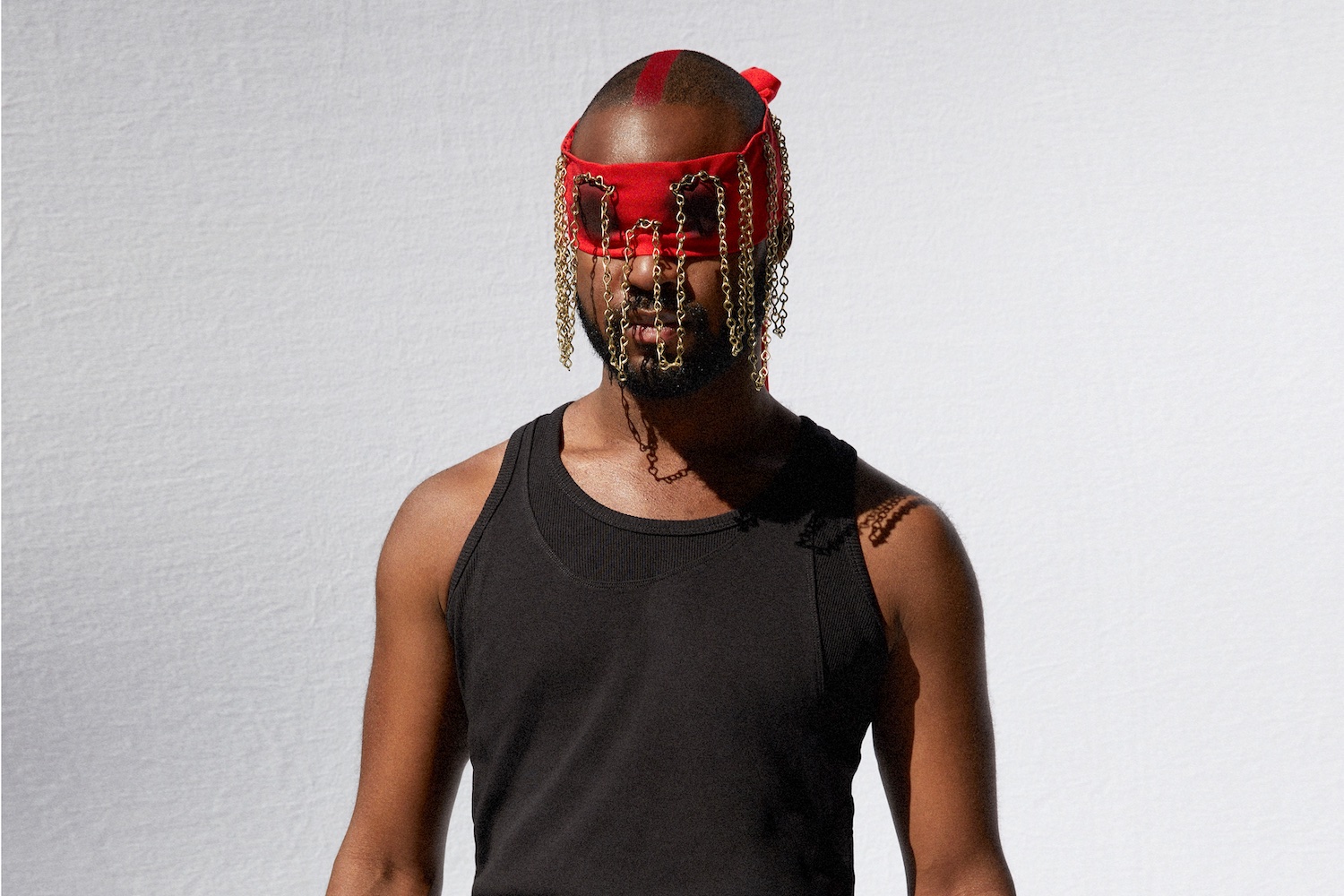
A CONVERSATION WITH GENESIS OWUSU

Atwood Magazine: So obviously, before we kind of jump in and talk about music, which, first of all, congratulations. It's an amazing, amazing project. Really, really great that I get to ask you some questions about it. But before I talk about the music, I wanted to ask you about the album cover.
In the past, you've always, whether it's been with your first album, kind of close up on that face. A lot of, you know, human elements on previous album covers. This is definitely more of a modern art vibe. Kind of more reaching for a feeling. And your Spotify picture has that red line down the middle. It looks amazing. When did you first kind of interact with that cover, and did you know it was kind of the one immediately?
Genesis Owusu: Yeah, yeah. So, I had a huge document of like potential album covers. A friend of mine was the graphic designer that I was kind of bouncing back and forth with. And yeah, it was definitely when I saw this one, like it just felt right. And I knew it was the one.
It captured the feeling I felt better than any of the more like cinematic options that we had in the bank: the album itself in regards to the music and the concept and the ethos. So, it was definitely like all about this strain of philosophy called absurdism.
And absurdism is kind of like a reaction to living in a world with no order, very chaotic and absurd, as said in the name. And kind of like about, in a sense, rejecting the need for meaning.
Like it’s kind of futile to keep putting yourself in turmoil by searching for meaning and order and logic in a chaotic and absurd world. And I just felt like that cover kind of encapsulated that in the best way because it could mean a lot of things or it could mean absolutely nothing.
But like, yeah, it had the center point of the line, the red stripe. Love it. Yep. So, it was definitely like it captured the identity of the main character, I suppose. And yeah, it kind of just had a lot of had a lot of meaning and no meaning at all. And I felt like it just felt right for what I was talking about in the album.
So, kind of looking towards those first three songs, you have “Leaving the Light,” “The Roach,” and “The Old Man.”
Starting with “Leaving the Light” going into “The Roach,” talking about this God chasing you down. And I wanted to ask, first of all, what brought about that in the studio? And then you spoke to the fact that the roach is kind of a character in this album. Is that you or is it more just kind of, I don't know, just a portrait of a general person?
Genesis Owusu: I think the roach in my perspective is just us in general. I think well, first of all, how it came about in the studio. It kind of came about before I went into the studio.
I wrote a short story, and it was the story of a roach that runs and runs and runs, trying not to get stepped on by God. And the album kind of came as a question of like, ‘how would this story sound?’ The roach, I guess, is a metaphor for us as humans, especially living in the world that we’ve all lived in for the past few years.
You know, going through these crazy global pandemics. Here in Australia, we went through these crazy bushfires, my house almost burnt down. You know, like, economic downfall, these wars that we can wake up and see on TikTok every day. Like it’s such like an absurd way to live and I feel like it’s really emphasized, I guess, how out of control we all are in the grand scheme of things. And how small we may seem to these forces that are like so large and looming around us, but you know through all of that, we managed to keep crawling through and keep making it to tomorrow. And I thought the roach was like a cool metaphor for that.
You know, this little bug, this little pest, vermin, but at the same time, it’s this thing that you can never really ‘get.’ Like, it’s supposed to be the something that will survive a nuclear war you know. You think you’ve stepped on it and then you lift your foot up and it’s not there. When you do get it, another one crawls out of the woodworks. It’s like a David and Goliath type situation. It’s this little thing that shouldn’t make it, but always manages to somehow. And the God character is the metaphor for all of those grand and looming uncontrollable forces that we that we battle against.
That's true. It's kind of just existing in spite. And so obviously you've talked about this in previous interviews, and you do a good job of having it as a motif but not necessarily a direct homage to, “The Metamorphosis” by Franz Kafka. When did you first interact with that story? And obviously, you wrote that, I saw something that you might have written that short story, like when you were in, when did you write that? In your teenage years?
Genesis Owusu: No, no. I used to write, I used to write stories when I was younger. But then that transitioned to poetry. And then that transitioned to music. So, I wasn’t really writing stories for a long time.
So, this kind of became like a kind of full circle moment where I wrote a story for the first time in ages and it informed the music that I was going to make. But I wrote the story last year, and I read the metamorphosis last year as well. And yeah, I just became like a huge inspiration for me because even though this book was written in like 1915, I think something like that, I read the first few passages and I just thought it was like hilariously on point with how we live and function today you know. The dude wakes up as a giant bug or vermin. And the first thing he thinks is like, ‘oh s**, how am I going to get to work today? What’s my boss going to think?’
Just like extremely absurd, but I thought it was like hilariously on point. And it spoke to the chaos and the absurdity of the world we live in, but also like the stubbornness of the human will to survive and just like keep going through all the bull*. Like, yeah, the world is burning around me, but it’s still got to make it to tomorrow. I’ve still got to keep pushing.
Gotta get the next paycheck. So those first three songs, they kind of, as we said, paint a picture of someone who's kind of existing to spite and in spite of whatever external forces are around them. And then you reference in “The Old Man” specifically you reference a ‘master.’
And so obviously there's very overt themes that you have working there. Is that what you're going for when you're using a word like ‘master’? Or is it more general? Like how you reference God in the first song?
Genesis Owusu: Yeah, when I reference a master, I kind of kind of do mean that in a very on the nose kind of way. It’s like these things are things that are controlling your life or maybe you’re letting them control your life, maybe you’re not, maybe you are, these are the things that I’m talking about, like your master is a system.
These things that I just spoke about, like pandemics and bushfires, like natural things that have occurred, but, you know, and these things that are things that we have created: bureaucracy and all of these strict and harsh systems that have, you know, created great things, but also have created a mode of living that can be very punishing.
Things that we’ve created with our own hands, but have slipped out of our control somehow. So, it’s like, your monster is all of these existential, esoteric, grand things, but they’re also things that we have made ourselves that have like slipped out of our own realm of control. You know, your master is a suit, your master is a dollar.
So, kind of referencing that kind of control you reference. It varies, the extent to which certain people are influenced and subdued by that. In big or small ways, how do you kind of release yourself from that control? Is creativity the main avenue?
Genesis Owusu: The main avenue. Yeah. Yeah. I think in “The Roach,” there’s a line. It’s like, ‘trying to break free with a penciled stanza.’ That’s kind of how I try to do it. Music is a means of self-expression, but it’s the way I figure out myself and the world around me.
It’s kind of like it’s my version of thinking out loud. So, music is definitely the way I try to break free from all of that. But I think in my personal life as well, as well as how the album kind of ends on the more absurdist tip, kind of just becomes ‘what comes will come’, you know?
It is what it is, and we just try and make the best of it. Instead of worrying so much about the steepness of the next pitfall, it’s kind of like appreciating the ups and the downs. So, viewing it as one grand roller coaster, you know, because you need the ups and the downs to make like a huge, thrilling, exciting ride. Just kind of appreciating everything for what it is and taking it all as it comes.
And you talk about music being a way that you think out your ideas about the world. Obviously, you're doing a lot of these songs in and around tour dates. You’re touring with people like Andrew (Klippel), Kirin (Callinan) and Touch Sensitive. So, to what extent do you feel like touring with them, and then just touring in general, doing orchestral concerts, do you think that those have tangible impacts on your sound? Or is it more of a you're just seeing more of the world and you're getting to respond to it in your own unique way?
Genesis Owusu: I think it probably works in a cyclical type of type of way. The way I had initially answered that is rather than the touring having an effect on the music I make or anything like that, it kind of feels like the opposite in a sense. Like, I put out this statement, these sounds, these, you know, catalogs of music and then the live show is almost like, ‘how can I like [mess] this up?’ And how can I reinvent this or recontextualize this, you know?
For example, like the show with the orchestra. Like, none of my songs have like an orchestra behind it. So, it was just like, how do we, yeah, reinvent this and create something new from what’s already there and recontextualize it and, you know, when there’s not an orchestra there, it’s kind of like, I’ll put in a narrative, and I would rearrange the songs to fit this new storyline and, you know, how can I create something new from what’s already there? But I think, you know, probably in a more subconscious level, doing that would definitely rejig how I approach music the next time I go to make music you know.
You've talked about Kafka and you’re doing all this like really wild stuff like performing with an orchestra. You've said that there's not a ton of direct influences on you musically. Because, you know, the music journalism ‘who influenced you?’ type question is a little on the nose. And they're trying to reach for a ‘just tell me what you are’ type thing. Kind of changing that a little bit to reference the Kafka conversation you're having earlier: Are there other pieces of media or art that you've interacted with while you're making this album that feel just as much like ‘that’s what I want’ than whatever instruments are brought into the studio?
Genesis Owusu: So there was a “Metamorphosis” Franz Kafka, there was “Waiting for Godot” by Samuel Beckett, and there was a manga called “Berserk” by Kentaro Miura. Those were the three things that influenced me more than any song or album or musical artist when I was writing this album.
Those were the three things that I was like consuming the most or that I had consumed that left the most impact. And they all have completely different storylines, but they all kind of coalesce into this similar storyline of just figuring it out, making it through, questioning why, how, all of that. And I think they all did it in such, like I said, all of the storylines are completely different.
They all did it in such individual ways, but they all kind of pertained to just like the most basic of human, the most human question ever. It’s like, ‘what’s the point?’ Like, ‘What am I doing here? How do I do it? Am I doing it right?’ They all kind of pertain to that. And I kind of wanted to create my own story that could be fit you know with those three as its peers you know.
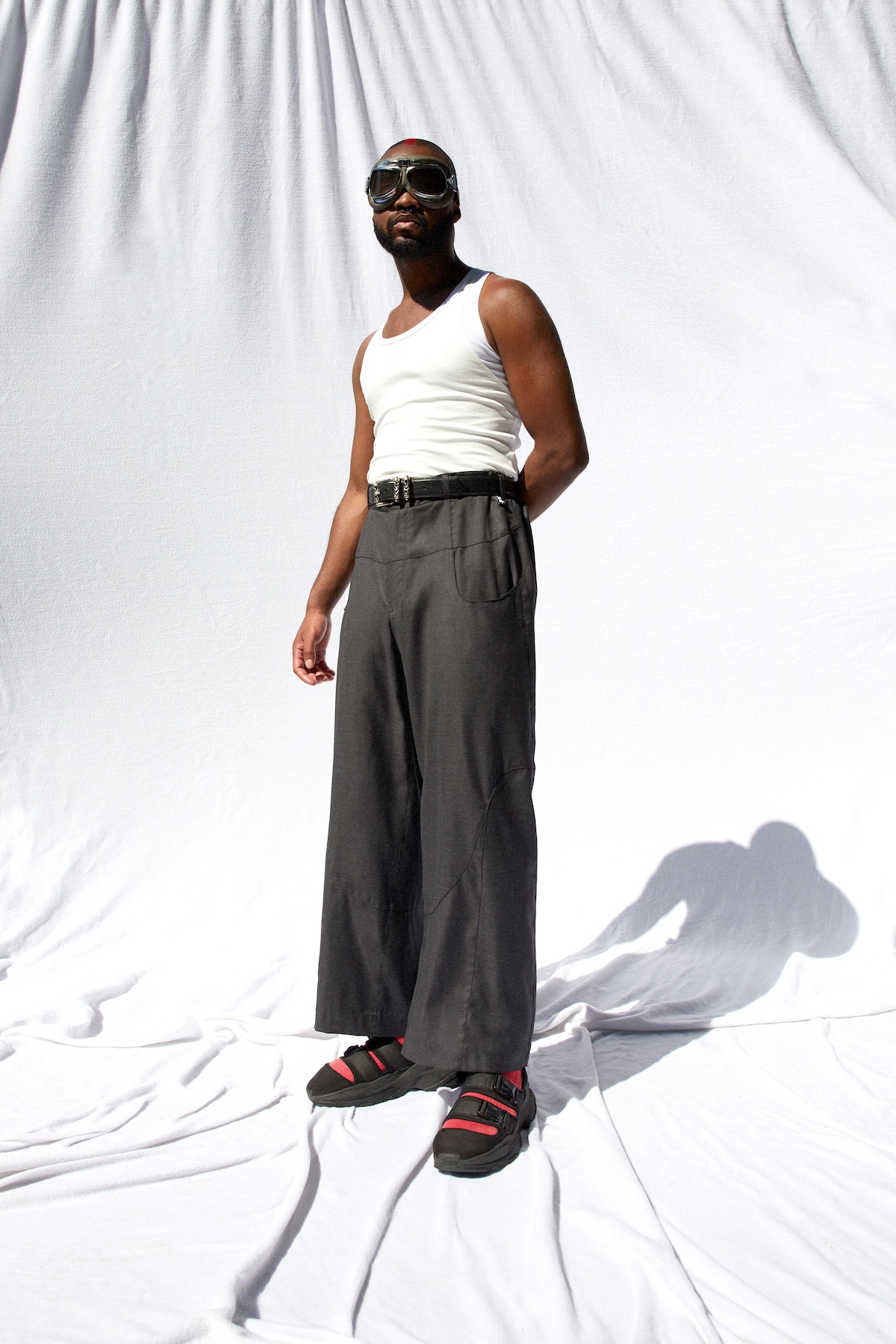
Looking back, you have black dog (from Smiling with No Teeth) and then you have the roach. Do you think that's an actual conscious transition? Or are those ideas conceived independently? And then, you know should we use that as a way to track future trends in your project?
Genesis Owusu: Hahaha, yeah, yeah. That was definitely a complete coincidence. And now I’m definitely going to try to make my next non-animal or insect related. Yeah, no, they were definitely made independently, I just tried to write a new story, essentially. I guess these animals or these insects and these symbols, I think, I just like using symbols and metaphors, you know, to relate to human experiences, but yeah, next album I’ll you know make it like a lamp or something.
You've said in the past that genres serve consumers of music a lot more than they serve the producers of music. Do you still connect with that? And then when did your voice kind of first come to you as a, ‘this feels like me?’
Genesis Owusu: Yeah, I still resonate with that statement. Maybe just more so pertaining to myself than all you know music. I still will never go into a studio, like ‘today I’m going to make a punk song,’ ‘today I’m going to make a soul song,’ it’s always just been like using genre like different colors in a painting. I’m trying to craft a whole project and I feel like when I feel this way, it tends to sound this way. It tends to come out in this genre and it all just coalesces together to create one grand, you know, portrait, and I think when I truly was almost like allowed to find that was on my first album.
Yeah, Smiling with No Teeth. I think in a lot of ways that album was born out of a frustration. Just because the way that the music industry works these days, it’s all streaming based and playlist based. So, you know before I was making albums, I would make a bunch of songs, but we’d release a single and then it would go on a playlist and it has to run for a certain amount of time and radio has to spin it for a certain amount of time.
And the whole process was very slow. So, I was releasing, I think the year before that first album, I maybe made probably like 15, 20 songs but released like three of them. And because it was such a slow process, people were like, okay, judging from these three songs, he makes funk/rap.
And you know in those 20 songs, I was making folk music, I was making punk, I was making electronic. I was like, I felt frustrated with being put in a certain box that wasn’t true. So, I felt like that first album was almost, yeah, was semi-born out of that frustration. Like, no, I’m not just the funk/rap guy, like I can do anything that my imagination can reach. I can reach balance of my imagination and your imagination.
Like I am… Whatever, I just am. You know, I’m not a certain thing. I just am. And yeah, the first album was like the playground where I got to like really show that off, I guess. Yeah.
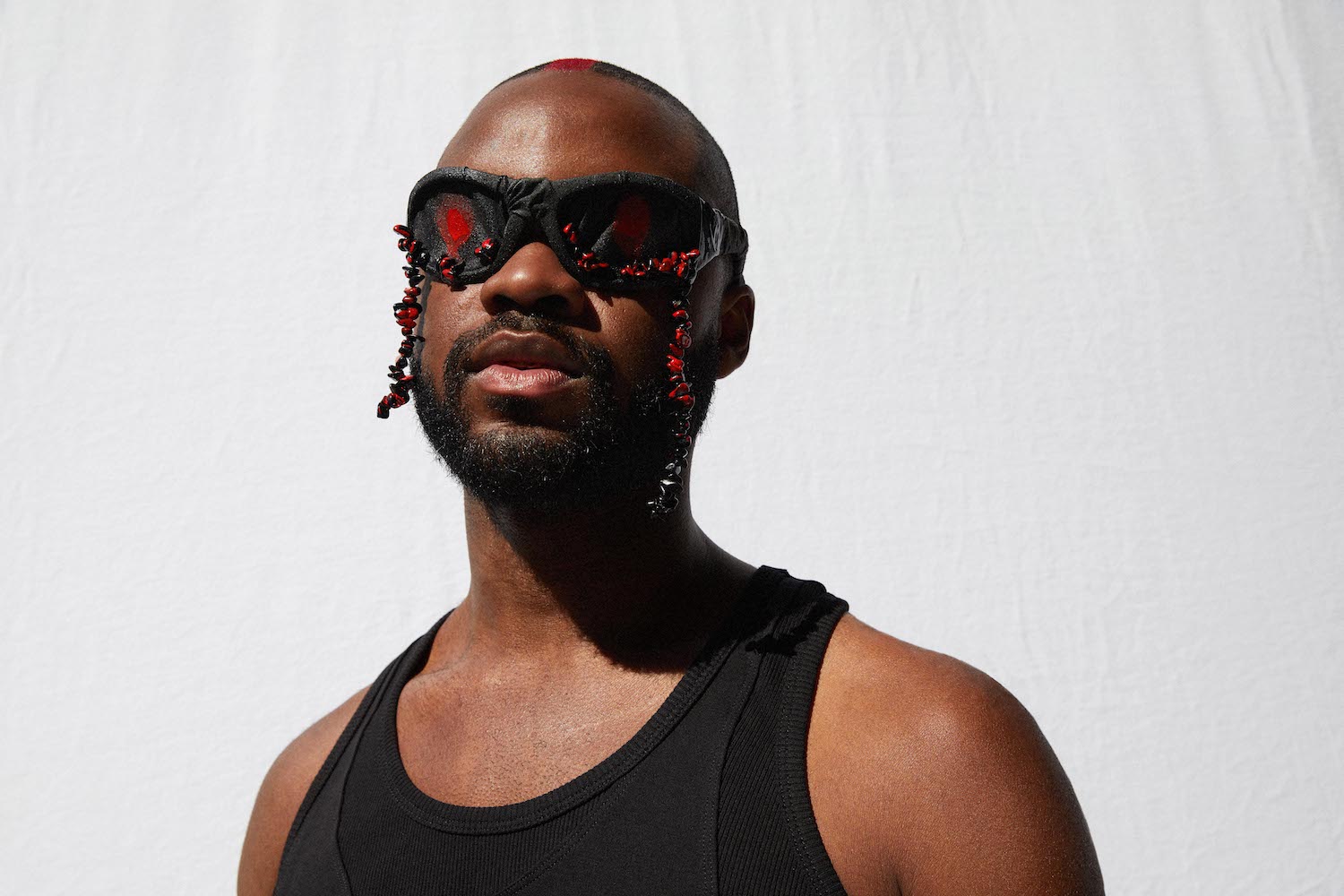
So, you’re referencing that it's not like you walk into the studio and you're like, ‘today, I'm going to make a punk song.’ Do you have a routine when you first get to the studio? What are those first like 15 minutes to 30 minutes like? Is it more of just a, let me kick back and get used to this space? Or is it like Prince, like calling all the engineers to formation?
Genesis Owusu: It’s wildly different from, you know, pretty much every time. Especially with this album, because I made it with a bunch of different people, a lot of the times I was like meeting those people for the first time as I was making music with them. So yeah, it was very different, especially with those people that I never met before. It was kind of like, get into the studio, tell me your life story. I’ll tell you my life story.
Let’s get to know each other on a very surface level basis because we’re going to have to try and make a song in these next like 5 hours. So yeah, I guess it’s just wildly different from person to person because you know it takes two to tango and they would have their own process and you know it’s really just dependent on how we interact with each other.
But for me personally, I’ll either go in knowing what I want to say or just recognizing how I feel on that particular time or in that particular day and the song will kind of just like verbalize that. Like, for this album, I had already written the story.
So, I kind of knew conceptually what I was going for going into it, but you know if I was feeling particularly down or particularly hopeful on a certain day, that would influence like, I guess, what chapter of the story I was writing that day. But yeah, in regards to like a specific process, there is no… it’s always just completely different every time I get in.
And I mean, especially when you're making music on a first date basis... On tour, how different is that from when you're recording Smiling with No Teeth? And do you feel like that brought something different out of you? Or is it you know, as you say, I just am?
Genesis Owusu: So, yes, Smiling with No Teeth was like a completely different process. And yeah, I don’t know. I think just everything is action and reaction. So, it just depending on what cards I’m dealt with is how I will yeah, figure out what happens next, I suppose.
Specifically, talking about songs like “See Ya There” and then “Stuck to the Fan”. You kind of just get dropped into it. It’s so glittery and it's very lush. And I love that you kind of toy with listeners expectations in that way. Because you go through the first three songs and I mean, it's different Genesis, but it's a lot of like, you know, similar sort of drum sounds and stuff like that. And then you kind of like pop this on us. And you work with Andrew Klippel on both of those.
So, what is it like kind of interacting with him musically? Because obviously he's in The Black Dog Band (your touring band) and then is your manager. What does that relationship look like?
Genesis Owusu: It’s really interesting. It’s a really interesting relationship because yeah, he’s also my manager. So, it’s cool, it’s cool, and strange, interacting with him on those two levels, specifically. Because he, you know, he has to think about my business and he’s the person I’m butting head with a lot of the time when he’s talking about radio, marketability and, you know, you know, the pop eccentrics or the pop aspects of things like this. But then on a musical level, he’s like this crazy eccentric musician.
So, it’s almost like he is butting heads with himself a lot of the time where it’s like, we as musicians just want to make the craziest sh* ever. And then he is a manager. And has to bring his head back and think of like, what will work on a financial basis and things like that.
So, it’s like a very interesting and fun, funny a lot of the time, annoying a lot of the time, relationship to have, but I think it just helps to bring out some stuff that’s like not brought out anywhere else. Yeah, like I said, he’s like this, he’s a crazy and eccentric musician and producer. Insanely talented, classically trained jazz pianist.
And he can just put his head into holes that I never would have thought of by myself, but at the same time, having this other perspective of the business angle also, in turn, shapes the music in a sense. So, it creates a product that, yeah, really just wouldn’t exist in any other collaboration.
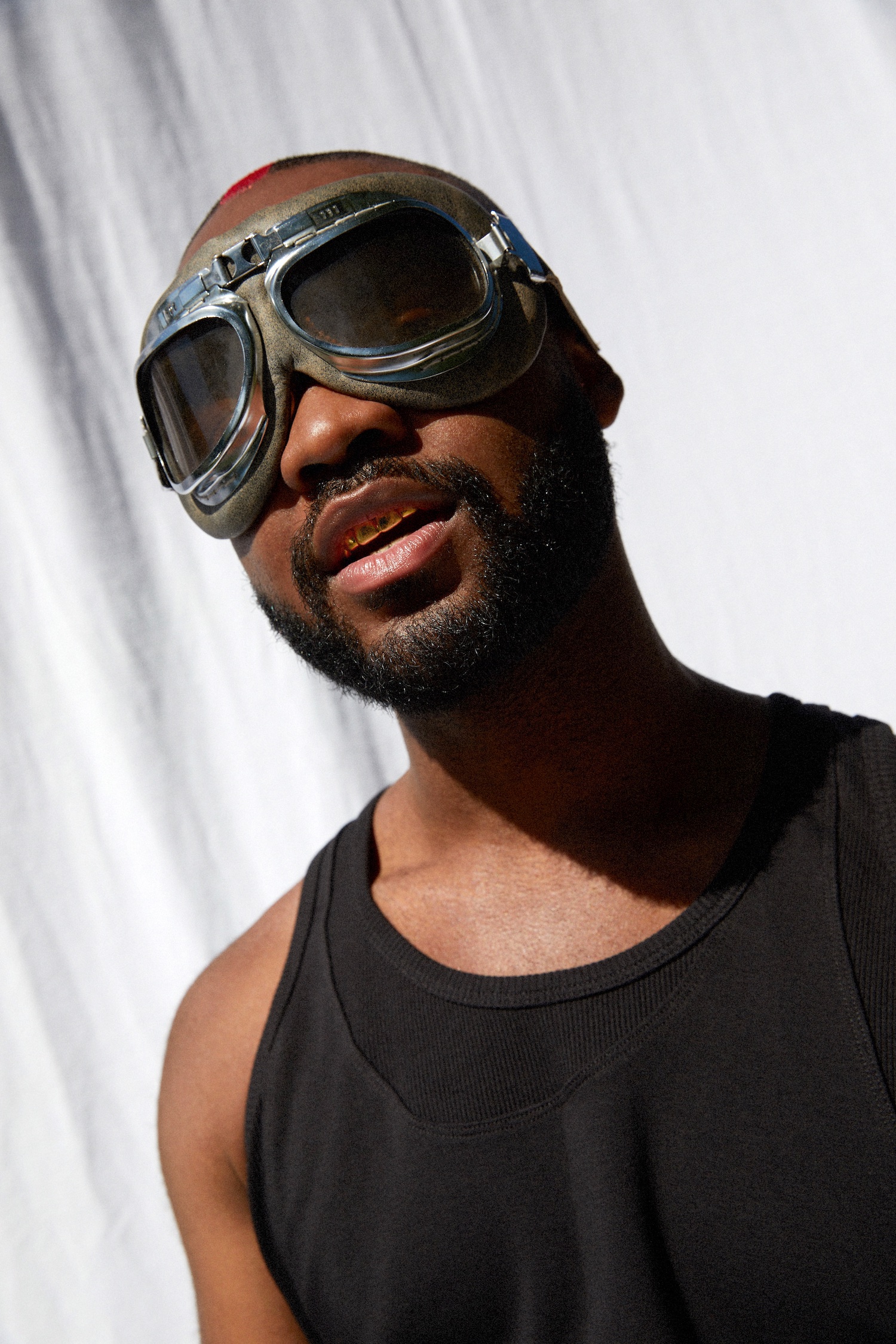
Especially with this album, because I made it with a bunch of different people, a lot of the times I was like meeting those people for the first time as I was making music with them. It was kind of like, get into the studio, tell me your life story. I’ll tell you my life story.
So, there's a lot of religious homages in this album. And I wanted to ask, how religious are you? And then is this more of a you know, as you talk about bureaucracy and then you know, you have religion and capitalism and stuff like that. Are these more like showing people messages through the systems that they usually adhere to?
Genesis Owusu: That’s exactly how I’d describe it. Yeah. Me personally, I wouldn’t consider myself a religious person, but my parents, specifically my mom, is. She was like the leader of our church’s gospel choir, and I went to church for like the first pretty much every Sunday for the first 18 years of my life.
I knew that it wasn’t really for me, but I kind of just tagged along for a lot longer just to keep my mom company. But at the same time, even though I didn’t necessarily believe it you know, English was my favorite subject and story writing was like my favorite thing at the time. So, I loved the law and the mythology and the parables and the symbols and the characters.
So, I loved using those characters and those parables in you know to tell my own stories and repurposing them to tell my own stories. But yeah you know, like you said, I don’t think I was ever really trying to actually talk about religion specifically you know. It was more just like using those characters and those systems that people are familiar with to tell a new story, I suppose.
And we're getting down towards the end, so I want to give a small little softball to sign off. And you can change this if you want it to be different art media, but what are your desert islands albums? And if you want to include some movies or Berserk. Let’s say five.
Genesis Owusu: All right. I’ll go Perfect Blue (Satoshi Kon). My favorite movie ever. I’ll go Berserk. I’ll go In Search of… by N.E.R.D. I will go… I’ll bring my Xbox and bring one game. I’ll bring Jet Set Radio Future. And I’ll bring the autobiography of Malcolm X. I think I hit every medium.
— —
:: stream/purchase STRUGGLER here ::
:: connect with Genesis Owusu here ::
— — — —

Connect to Genesis Owusu on
Facebook, Twitter, TikTok, Instagram
Discover new music on Atwood Magazine
© Bec Parsons
:: Stream Genesis Owusu ::

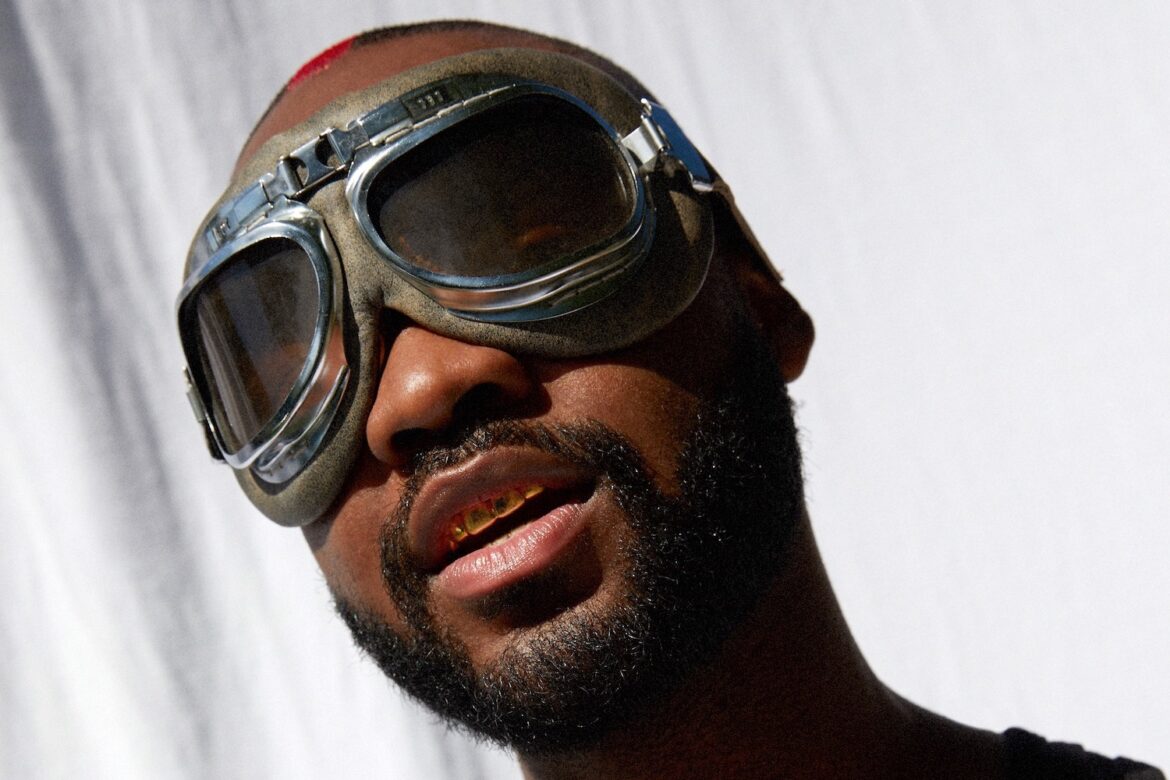
 © Bec Parsons
© Bec Parsons